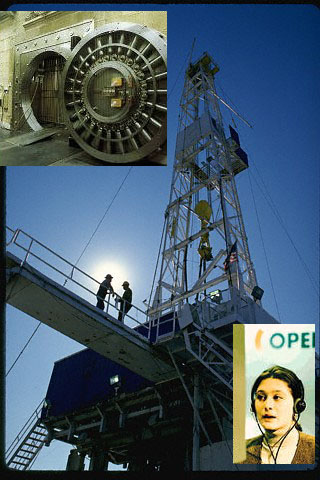REQUIRED
-
Peter F. Klaren, "Lost Promise: Explaining Latin
American Underdevelopment," in Peter F. Klaren and Thomas J. Bossert,
eds., Promise of Development: Theories of Change in Latin America
(Boulder, CO: Westview, 1986):3-33.
-
Andre Gunder Frank, "The Development of Underdevelopment,"
in Peter F. Klaren and Thomas J. Bossert, eds., Promise of Development:
Theories of Change in Latin America (Boulder, CO: Westview,
1986):111-23.
-
Teodoro dos Santos, "The Structure of Dependence,"
The American Economic Review, May 1970, 60 (2):231-6.
-
Peter Evans, "Multinationals, State-Owned Corporations,
and the Transformation of Imperialism: A Brazilian Case Study, Economic
Development and Cultural Change, October 1977, 26 (1):43-64.
- Gary Gereffi, "Drug Firms and Dependency in Mexico:
The Case of the Steroid Hormone Industry," International Organization,
Winter 1978, 32 (1):237-86.
RECOMMENDED
-
Hernando de Soto, The Other Path: The Invisible
Revolution in the Third World (New York: Harper & Row, 1989),
p. xxi-xxviii, 3-26, 131-87.
-
J. Samuel Valenzuela and Arturo Valenzuela, "Modernization
and Dependency: Alternative Perspectives in the Study of Latin American
Underdevelopment," Comparative Politics, July 1978, 10 (4):535-52.
-
Fernando Henrique Cardoso and Enzo Falleto, Dependency
and Development in Latin America (Berkeley: University of California
Press, 1979), p. vii-xxv, 149-216.
-
Gary Gereffi and Donald L. Wyman, Manufacturing
Miracles: Paths of Industrialization in Latin America and East Asia
(Princeton, NJ: Princeton University Press, 1990), 1-51.
-
Gary Gereffi and Donald L. Wyman, Manufacturing
Miracles: Paths of Industrialization in Latin America and East Asia
(Princeton, NJ: Princeton University Press, 1990), p. 90-109, 292-320
(contributions by Bradford and Villareal).
-
Gary Gereffi and Peter Evans, "Transnational Corporations,
Dependent Development, and State Policy in the Semi-Periphery: A
Comparison of Brazil and Mexico," Latin American Research Review,
1981, 16 (3):31-64.
-
Steven Haber, "Assessing the Obstacles to Industrialization:
The Mexican Economy, 1830-1940," Journal of Latin American Studies,
February 1992, 24 (1):1-32.
-
J. MeyerStamer, "Path dependence
in regional development: Persistence and change in three industrial
clusters in Santa Catarina, Brazil, World Development, August
1998, 26 (8):1495-1511.
-
Albert O. Hirschmann, "The Rise and Decline of
Development Economics," in Essays in Trespassing: Economy to
Politics (New York: Cambridge University Press, 1981).
-
Eliana Cardoso and Albert Fishlow, "Latin American
Economic Development: 1950-80," Journal of Latin American Studies,
Supplementary issue, 1992 (24):197-218.
-
Albert O. Hirschmann, "The Political Economy of
Import-Substituting Industrialization in Latin America," The
Quarterly Journal of Economics, February 1968, 82 (1):1-32.
-
Werner Baer, "Import Substitution and Industrialization
in Latin America: Experiences and Interpretations," Latin American
Research Review, Spring 1972, 7 (1):95-111.
-
Patricio Meller, ed., The Latin American Development
Debate: Neostructuralism, Neomonetarism, and Adjustment Processes
(Boulder, CO: Westview, 1991), p. 9-40, 59-75 (French-Davis and
Munoz, Lustig, and Rojas).
- Robert Packenham, The Dependency Movement: Scholarship
and Politics in Development Studies (Cambridge, MA: Harvard University
Press, 1992).
LITERARY OVERLAY
- Gabriel Garcia-Marquez, One Hundred Years of
Solitude (New York: Harper & Row, 1970) OR Alejo Carpentier, Reasons
of State (New York: Knopf, 1976).
|

Vault of a Chilean bank, Venezuelan oil rig, bank
worker.
|
![]()
![]()
![]()
![]()
![]()